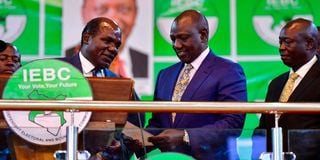Kenya's former electoral chief Wafula Chebukati dies at 63

Former Independent Electoral and Boundaries Commission (IEBC) Chairman Wafula Chebukati.
What you need to know:
- Mr Chebukati completed his six-year tenure at the helm of the Independent Electoral and Boundaries Commission on January 17, 2023.
Wafula Wanyonyi Chebukati, the former chairman of Kenya’s Independent Electoral and Boundaries Commission (IEBC), has died at the age of 63.
Chebukati, who led Kenya’s electoral body for six years, oversaw two highly contested presidential elections—one in 2017, which was annulled by the Supreme Court, and another in 2022 that divided the commission and sparked political tensions.
His term as the IEBC Chairman began in January 2017 following the removal of Ahmed Issack Hassan and his fellow commissioners.

Former Independent Electoral and Boundaries Commission (IEBC) Chairman Wafula Chebukati.
The low-profile lawyer took office at a politically charged time, with opposition leader Raila Odinga facing off against President Uhuru Kenyatta, who was seeking re-election.
Taking office just under seven months before the election, Mr Chebukati and his team were tasked with delivering one of Kenya’s most competitive elections.
However, his first General Election test started on the wrong footing as the outcome of the presidential polls in 2017 was overturned by the Supreme Court in a landmark ruling.
In its ruling, the apex court, then led by Chief Justice David Maraga, found that the election won by incumbent Uhuru Kenyatta against opposition leader Raila Odinga was marred by irregularities and illegalities by the IEBC.

IEBC chairman Wafula Chebukati (left) presents Deputy President William Ruto with a certificate after Mr Uhuru Kenyatta was declared winner of the presidential election, at the Bomas of Kenya on October 30, 2017. Kenyans want the role that Cambridge Analytica played in the election revealed.
The Supreme Court ordered a fresh presidential election to be held within 60 days.
However, opposition leader Raila Odinga boycotted the repeat poll, stating that he could not participate in an election presided over by the same team that had "bungled" the previous one.
As the man who presided over two disputed presidential elections, Mr Chebukati was frequently at loggerheads with the political class but resisted calls for his resignation.
The 2022 presidential election was no different, as the opposition claimed their candidate, Mr Odinga, was rigged out in favour of William Ruto.
The opposition, which unsuccessfully challenged the poll results in the Supreme Court, alleged that unauthorized access to the commission’s system had allowed some individuals to manipulate the final results in Dr Ruto’s favour.
However, the Supreme Court dismissed these claims and upheld Dr Ruto’s victory, terming some of the allegations in the petition ‘hot air’, paving the way for his swearing-in as Kenya’s fifth president.

President William Ruto standing next to his deputy Rigathi Gachaua receives a certificate from Independent Electoral and Boundaries Commission (IEBC) chairman Wafula Chebukati at the Bomas of Kenya Tallying Centre in Nairobi on August 15, 2022.
In the run-up to the August 2022 polls, but especially during the vote counting, intense internal wrangles emerged within the commission, leading to a split among commissioners over the running of affairs at the polls agency.
The seven commissioners were divided into two factions: one led by Mr Chebukati, Boya Molu, and Abdi Guliye, and the other consisting of vice chairperson Juliana Cherera, Francis Wanderi, Irene Masit, and Justus Nyang’aya.
Indications of internal discord became apparent when electoral materials arrived in the country, revealing that some commissioners were unaware of what was being delivered.
Several press conferences at the Bomas of Kenya further highlighted the rift.
At one point, a journalist asked the chairman whether the information he was providing had the endorsement of all commissioners.
“Has any of them disputed? Is there anyone?” Mr Chebukati retorted, looking at the commissioners flanking him during the press conference.
The silent war within the IEBC continued, but tensions ultimately boiled over when four commissioners publicly opposed the transmission of presidential election results.
Commissioners Francis Wanderi, Irene Masit, Justus Nyang’aya, and Vice Chair Juliana Cherera disputed some of the results being announced by Mr Chebukati, claiming they had not been verified by all commissioners as agreed.
The breakaway commissioners—later dubbed the "Cherera Four"—stormed out of Bomas of Kenya and held a press conference at Serena Hotel, where they rejected the presidential results being announced by the commission.
Among their grievances was the claim that the average percentages of the four presidential candidates’ results exceeded the 100 per cent mark, casting doubt on the accuracy of the vote tally.
They also accused Mr Chebukati of ignoring their recommendations when they presented their concerns, arguing that he had effectively designated himself as the returning officer.
The chairman had the last laugh as the opposing group eventually left the commission with one of them, Ms Masit, kicked out after a tribunal was formed to probe her conduct.
While some saw Mr Chebukati as a leader who refused to listen, others viewed him as a firm, principled individual who was not swayed by external forces.

President William Ruto, receives an exit report from former IEBC Chairman Wafula Chebukati during a consultative meeting with members of the Constitutional Commissions and Independent Offices at State House, Nairobi.
After leaving office at the end of his six-year term, Mr Chebukati largely kept a low profile, with reports suggesting that his health was deteriorating.
Born on December 19, 1961, Mr Chebukati held a Bachelor of Law degree from the University of Nairobi, and Master of Business Administration from the Jomo Kenyatta University of Agriculture and Technology.
He was a politician and member of Orange Democratic Movement which he resigned from before applying for the position of Chairperson of IEBC. In 2007, he contested the Saboti Constituency parliamentary seat and came in second place.





